How can we help you?
-
Getting Started
- What is HuddleIQ?
- Creating an Account
- Members, Guests, and Visitors - Differences
- Your Profile
- What is a Board?
- What is the DashBoard?
- What is a Project?
- What is a Member?
- Becoming a Member or a Guest
- Notifications
- Task List
- What is a Visitor?
- What is an Invitation?
- Board Roles and Permissions
- Project Roles, Permissions, and Settings
- Free Forever Plan
- Providing Feedback
- Getting Help
- What's New
-
Using the Dashboard
-
Using the Board
- Alignment Aid
- Attendee's List
- Board History
- Borderless Video
- Changing the Background
- Changing the Object Shape
- Collaborator's Cursors
- Exiting a Board
- Export Embed Code
- Full Screen
- Import and Export
- Keyboard and Mouse Shortcuts
- Linking Objects
- Object Defaults
- Pasting on the Board
- Saving a Board
- Selecting Multiple Objects
- Selection and Panning
- Selection versus Edit Mode
- Settings & Integrations
- The Toolbars
- Track and Aid
- Undo and Redo
- Using the Board Map
- Zooming
-
Board Tools
- Align and Arrange Objects
- Cards
- Chat
- Checklists
- Comments
- Comments List
- Container
- Creating Your Own Templates
- Custom Colors
- Documents and Presentation
- Embed iFrame or URL
- Eraser
- Export the Board
- Images as Backgrounds
- Lists with Indents
- Library
- Lines and Arrows
- Objects
- Pen and Highlighter
- Polls
- Presentation Mode
- Resources
- Shapes
- Slides
- Sticky Notes
- Task Timer
- Templates
- Title
- Video and Screen Conferencing
- Votes
-
Templates
-
Integrations
-
Administrators
-
Dashboard Video Tutorials
- Dashboard Basics: An Introductory Guide - Video
- Members, Guests and Visitors Differences - Video
- Managing Members & Guests - Video
- Exploring Projects, Boards & Dashboard - Video
- Private vs. Shared Projects A Comparison - Video
- Creating a Board A Simple Guide - Video
- Mastering 'My Boards' - Video
- Managing Board Operations Duplication, Moving, Renaming, Deletion - Video
- Board Information How to Get More - Video
- Profile Management Tips - Video
- Providing Feedback A How-To - Video
- Staying Updated Viewing New Features - Video
- Role of Administrators in HuddleIQ - Video
- Optimizing Your Organizational Profile - Video
- Subscription Management - Video
- Billing Management - Video
- Google Drive Integration: A Guide - Video
- Getting Help Resources & Tips - Video
- Recycle Bin A Comprehensive Guide - Video
-
Board Video Tutorials
Meetings & Workshops Templates

4 L's Retrospective
4 L’s is a quick retrospective that helps teams find what they liked, learned, lacked, and longed for on a topic or project.
4P's Marketing
4P’s are powerful because they concisely account for the seller’s most important objectives and the target audience’s most critical requirements, both of which are pivotal to commercial performance.
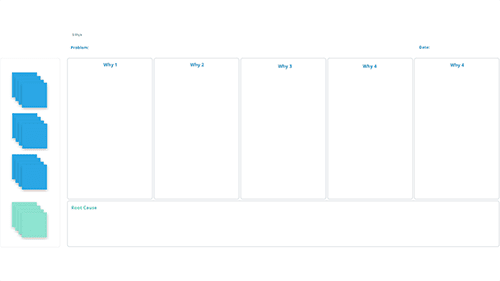
5 Why's
5 Whys is an effective brainstorming tool that helps identify problems and gets to the root causes so you can focus on solutions.

6 Thinking Hats Technique
Six Thinking Hats provides direction to decision-making and group thinking. To help teams generate and evaluate different points of view.

666 Roadmap
666 Roadmap focuses you and your team on thinking across three timelines for projects and goals; the next six years, the next six months, and the next six weeks.

7P's Marketing
7P’s are powerful because they concisely account for the seller’s most important objectives and the target audience’s most critical requirements, both of which are pivotal to commercial performance.

A3 Problem Solving
A3 Problem Solving is a problem-solving and continuous-improvement approach. Effectively communicates project status and provides structure to the strategic decision-making process.

ADDIE Model
The ADDIE model is a process used by instructional designers and training developers. The five components are Analysis, Design, Development, Implementation, and Evaluation, a flexible guideline for building practical training, and performance support tools.
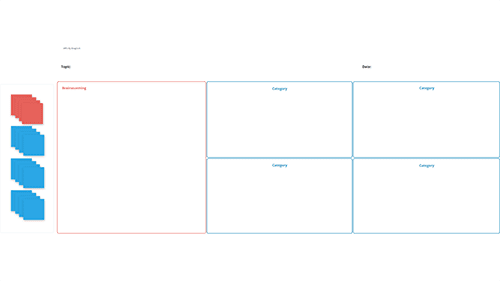
Affinity Diagram
Affinity Diagrams are a method that helps you organize a large number of ideas into their natural relationships, typically born out from brainstorming sessions.

Ansoff Matrix
Ansoff Matrix is a great framework that helps firms devise strategies for product and market growth.
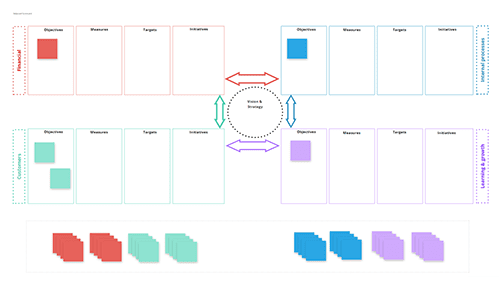
Balanced Scorecard
Balanced Scorecards are a tool used to establish metrics and targets that measure and manage the organization’s performance against its strategic objectives.

BCG Matrix
BCG Matrix is a planning tool designed to help with long-term strategic planning that helps businesses consider growth opportunities by reviewing their portfolio.

Brainstorming Session
A brainstorming session is a group creativity technique by which efforts are made to find a conclusion for a specific problem or develop new concepts by gathering as many new ideas spontaneously as possible.
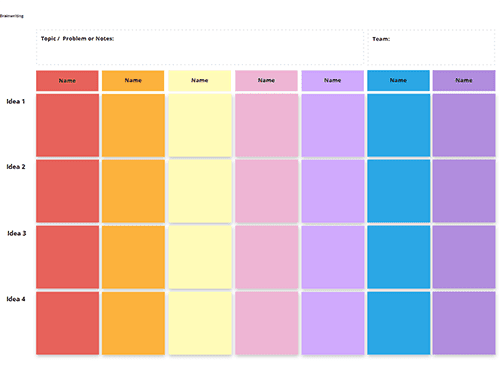
Brainwriting
Brainwriting is the group-structured generation of ideas aimed at aiding innovation processes by stimulating creativity.

Bull's Eye Diagram
The Bullseye template helps with decision-making, assisting the teams to see what’s critical, essential, and merely peripheral.

Concept Brief
Concept Briefs are a short outline of concepts or requirements, such as a project’s marketing or advertising requirements.

Concept Poster
A Concept Poster is a powerful way to concisely and visually convey the essence of a concept or idea.

Crazy Eights
Crazy Eights is a quick brainstorming session giving team members eight minutes to sketch out eight ideas.
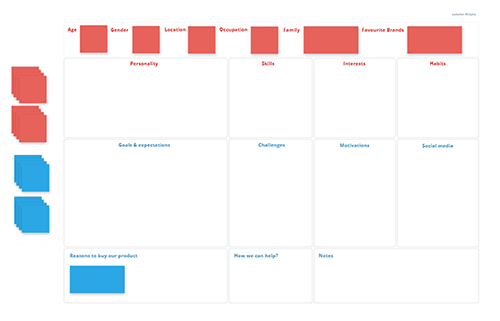
Customer persona
Customer personas are a simple way to gather data on a target audience, therefore helping you design your products or services to cater to their needs.
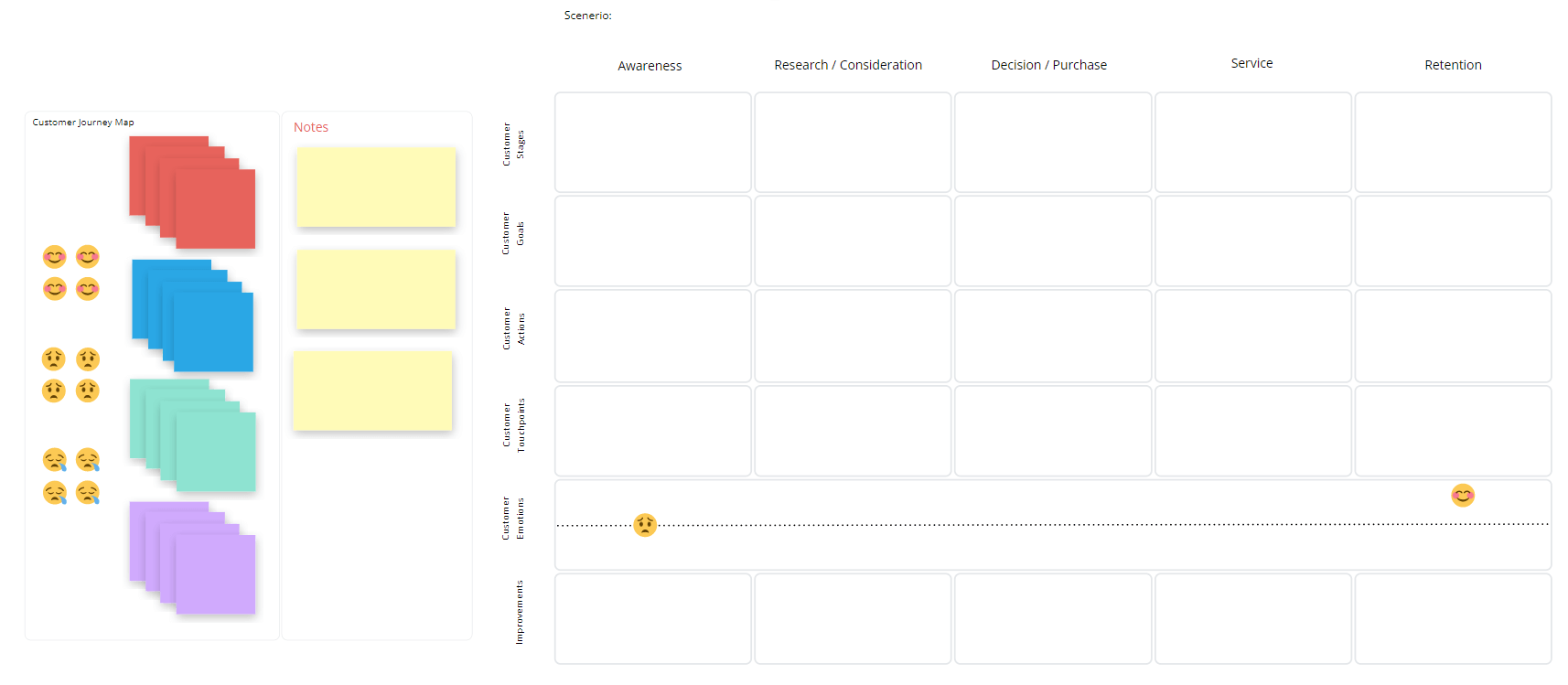
Customer Journey Map
Customer Journey Map represents your customer’s pain points, wants, needs, and overall experience; this is vital for success. Use CJMs to solve problems and fill gap

Customer Problem Statement
Customer Problem Statements are detailed descriptions of customer issues and needs for your team to address.

Daily Standup
Daily Standup is a brief 5-15-minute meeting for agile teams, giving everyone the chance to provide a quick progress update to help keep everyone informed and on track.
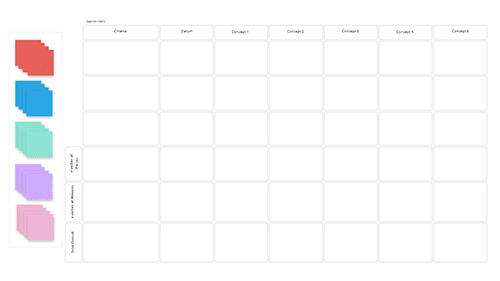
Decision Matrix
A decision matrix template is a tool that can help you evaluate the best options based on several essential factors able to calculate the weighted average of each option to determine which one is superior compared to others and their relative importance.
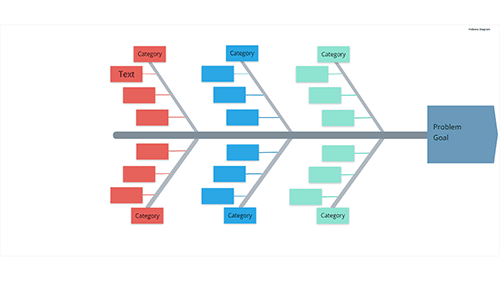
Fishbone Diagram
Fishbone Diagrams are exceptional at visually identifying problems by focusing on cause and effect.
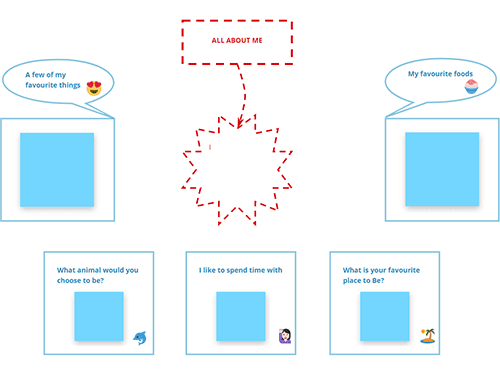
Getting To Know Each Other
Remote workers will save time by using this template to get to know each other.
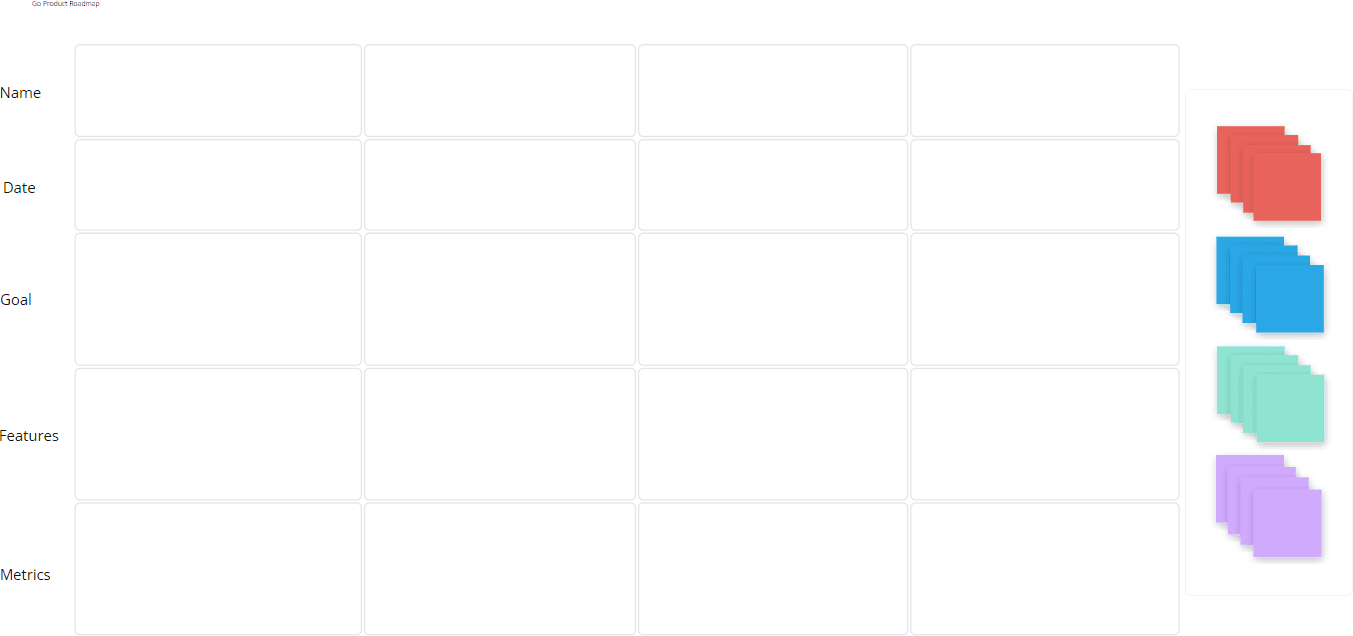
Go Product Roadmap
GO Product Roadmap is an excellent tool that helps you plan, share everyone’s ideas, target issues, and prioritize tasks.
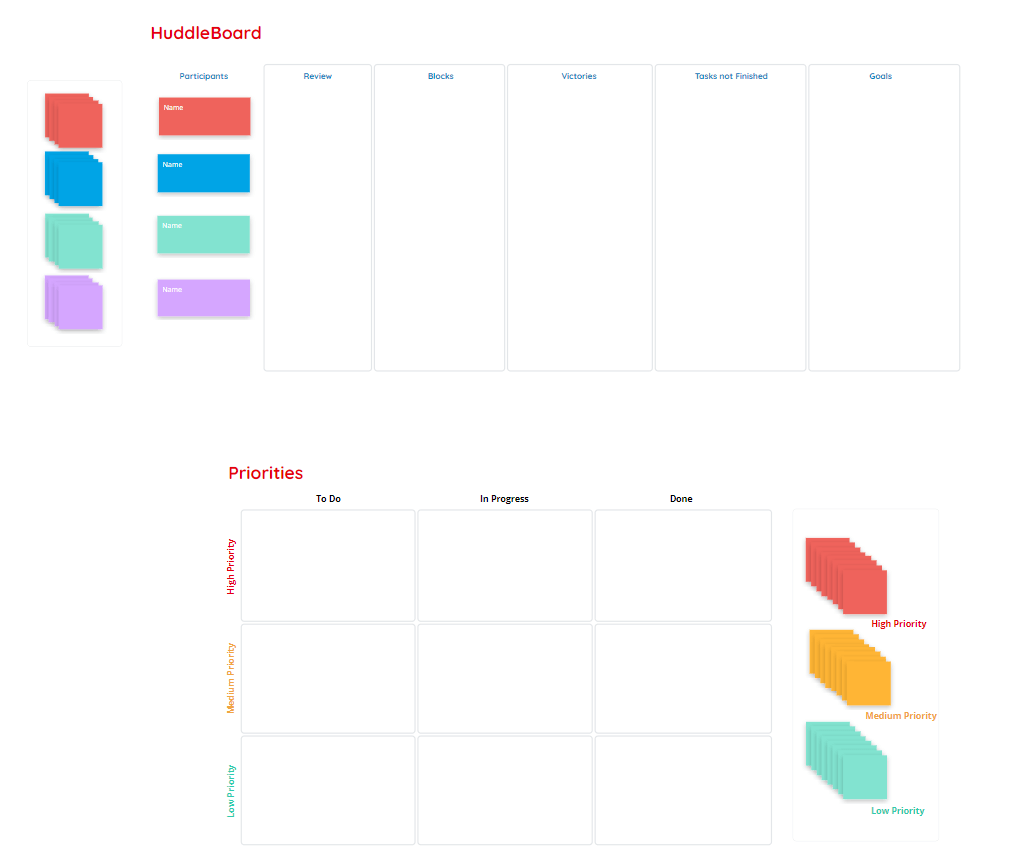
HuddleBoard
HuddleBoard helps teams reflect on the last month’s victories and bottlenecks. Giving everyone the chance to provide a quick progress update to help keep everyone informed and on track by organizing their thoughts and creating a task schedule to help them stay on top.
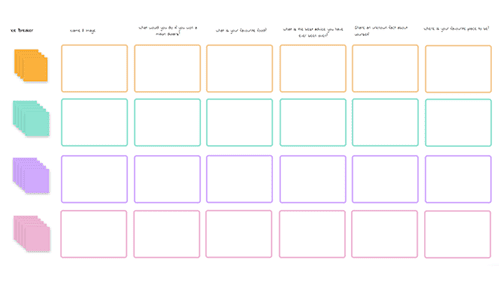
Ice Breaker
Ice breakers are valuable for any team, particularly remote teams, as they help team members become comfortable and familiar with each other.
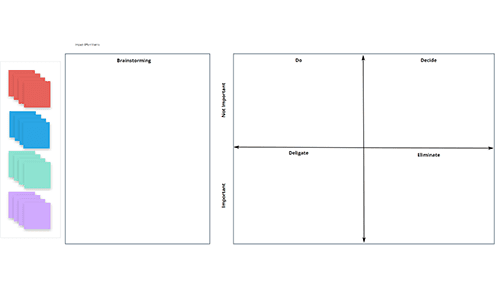
Impact Effort Matrix
Impact Effort Matrix is a decision-making tool that defines the impact and effort of activities so that your team better prioritizes tasks.

JoHari Window Model
Johari Window Model is a framework that allows individuals to enhance their understanding of themselves and others in a group or among other groups, to improve individual and team performance.
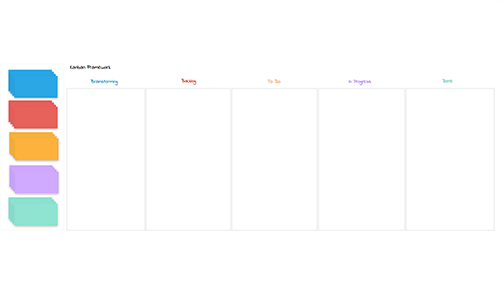
Kanban Framework
Kanban boards are a visualization tool that enables you to enhance how a team works by using notes representing work items and columns representing each stage of the process.

KPT (Keep, Problem & Try)
KPT (i.e., Keep, Problem & Try) are retrospectives for meetings that teams use to reflect on their project, assess what your team wants to keep doing, what problems they are facing, and what they want to try out.

KWHLAQ Method
KWHLAQ Method is a strategy you can apply to significantly improve your ability to learn efficiently and retain what you have learned.

Lean Canvas
Lean Canvas is a short business plan that helps your team deconstruct an idea into its key assumptions, allowing you to set out the critical information you need to determine profitability and get everyone on the same page.
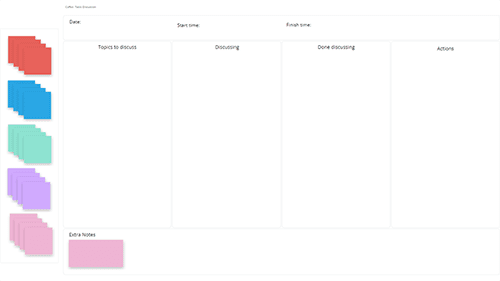
Lean Coffee
The lean coffee template helps teams structure meetings or a scrum. A guide to better discussions and outcomes empowers teammates to come prepared, stay on-task, and leave with productive takeaways. It can also be used as an educational tool.

Lean Pitch Canvas
Lean Pitch Canvas is a short but focused brainstorming tool that helps you structure and visualize your pitch on one page.

Lean Startup Canvas
Lean Startup Canvas helps you outline initial ideas for a product or service and evaluate its strengths and weaknesses by focusing on problems, solutions, key metrics, and competitive advantages.

Look Mock Analyze
Look, Mock, Analyze inspires discovery, outlining the issue, mocking up solutions, and analyzing the scenario with instant feedback.

Lotus Diagram
Lotus Diagrams help you expand your thinking through the visual representation of an idea. Also known as the lotus blossom technique, it focuses on the power of brainstorming and often yields better results than mind mapping.
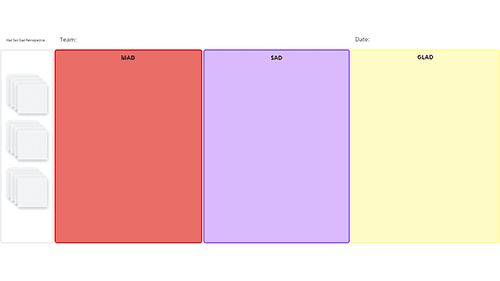
Mad Sad Glad Retrospective
Mad, Sad Glad is a quick retrospective for short meetings where your team may reflect on their recently completed work and assess what worked well and what needs to be improved.

Meeting Agenda
Meeting Agenda provides a guide to stay on agreed topics and empowers teammates to come prepared, stay on-task, and leave with productive takeaways.

Meeting Notes
Meeting Notes records what happened during a meeting geared for agile teams that helps everyone.

Meeting Planner
Meeting Planner provides a guide to stay on agreed topics and empowers teammates to come prepared, stay on-task, and leave with productive takeaways.
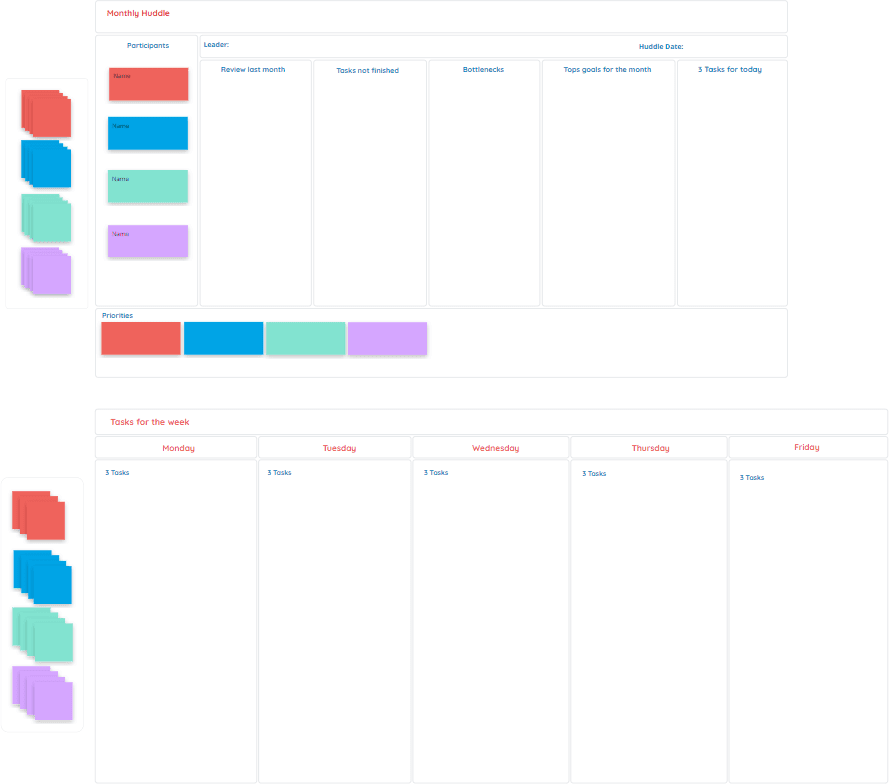
Monthly Huddle
A Monthly Huddle is a meeting for agile teams to help review the last quarter. Giving everyone the chance to provide a quick progress update to help keep everyone informed and on track. Helping the team to plan the best way to move forward for the next quarter.
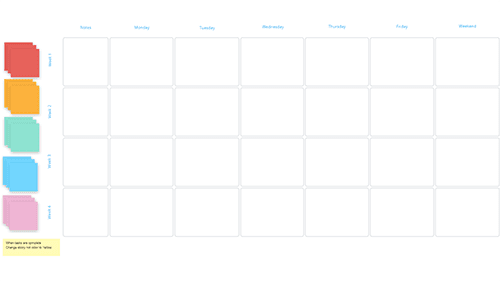
Monthly Planning Calendar
Monthly Planner structures you and your team’s tasks for the month ahead to better plan timelines, resources, and outcomes.

Monthly To Do List
Monthly To-Do lists help you stay and your team organized by creating a weekly task schedule.

Monthly Planner
Monthly Planner structures you and your team’s tasks for the month ahead to better plan timelines, resources, and outcomes.
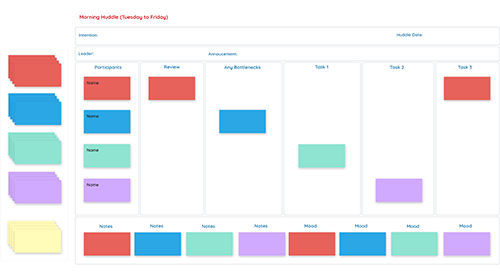
Morning Huddle (Tuesday to Friday)
Morning Huddle is a brief 8-10-minute meeting for agile teams, giving everyone the chance to provide a quick progress update to help keep everyone informed and on track.

MoSCoW Prioritization
Morning Huddle is a brief 8-10-minute meeting for agile teams, giving everyone the chance to provide a quick progress update to help keep everyone informed and on track.

Now Next Later Never
Now, Next, Later, Never is a popular four-panel matrix that asks teams to feedback on the positives and negatives of a topic or project.

OKR (Objectives & Key Results)
Objectives & Key Results helps your team build goals or objectives and fast track the outcome.
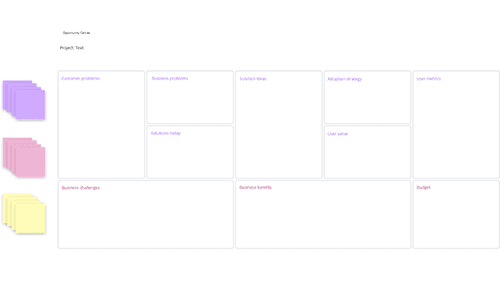
Opportunity Canvas
Opportunity Canvas facilitates discussion about a product’s features or capabilities and helps you walk through how customers use or will use your solution, highlighting potential setbacks, strategies, challenges, and metrics.

Organizational (OPG) Chart
Organizational (OPG) Chart will generally reflect reporting structure (who manages specific teams and people). It can be beneficial for new employees to refer to as they familiarize themselves with your company.
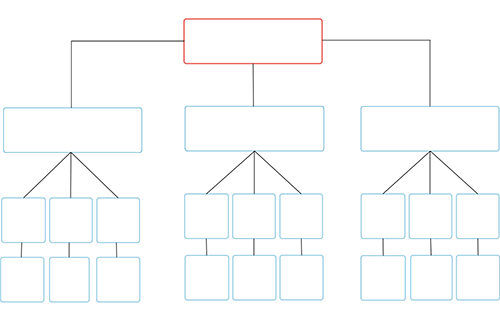
Organizational (OPG) Chart - Blank
Blank Organizational (OPG) Chart will help you start planning the company structure (who manages specific teams and people). It can be beneficial for new employees to refer to as they familiarize themselves with your company.

PEST Analysis
PEST analyzes internal and external factors that may impact your company’s performance, focusing on political, economic, technological, and social influences. Valuable because they aid strategic planning, market research, and budget allocation.

PESTEL Analysis
PESTEL analyzes internal and external factors that may impact your company’s performance, focusing on political, economic, technological, social, environmental, and legal influences. Valuable because they aid strategic planning, market research, and budget allocation.
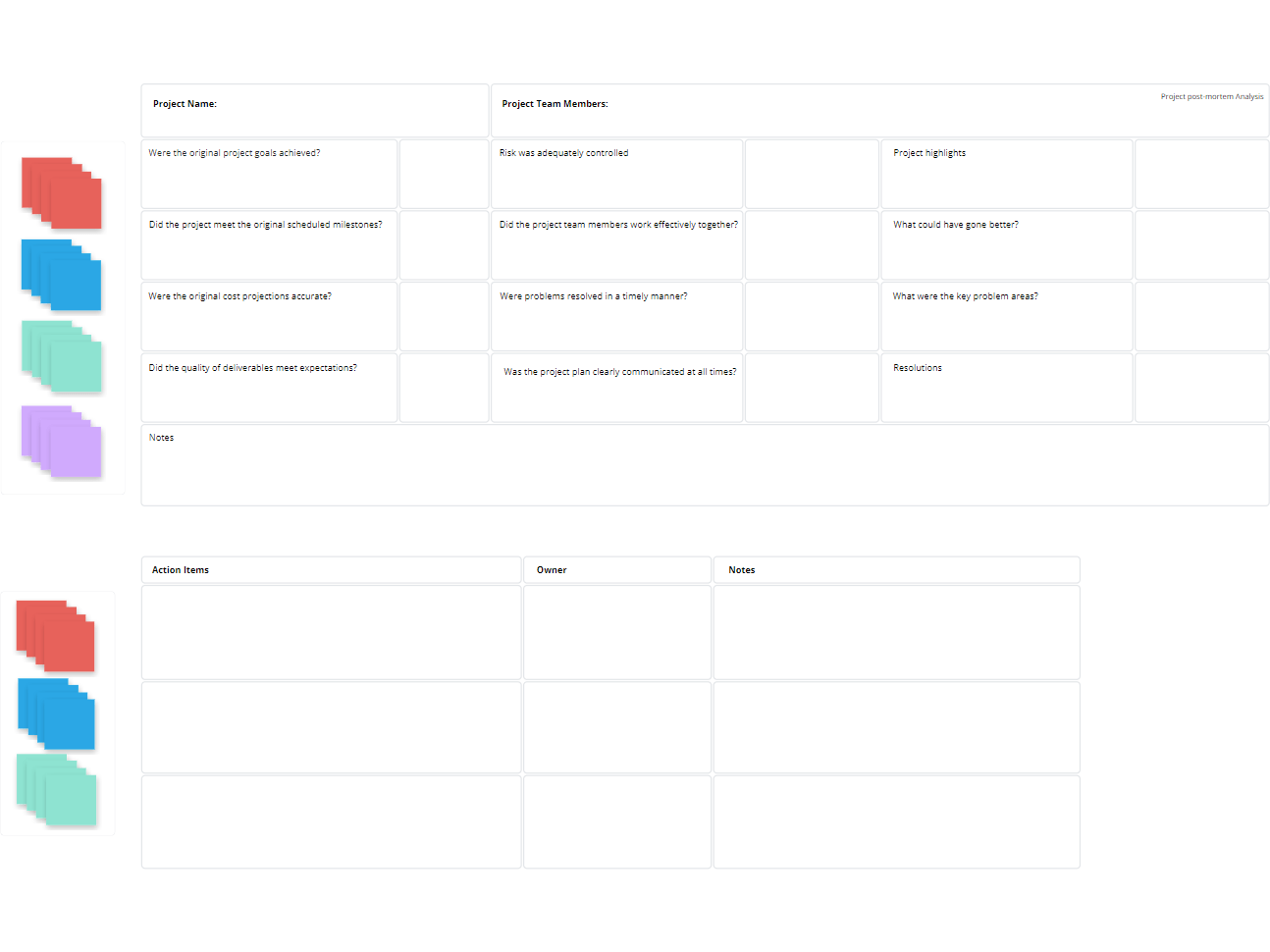
Post-mortem Analysis
A post-mortem analysis performed at the end of a project is part of risk management to identify the causes of project failures and prevent them from happening in the future and helps guide constant improvement by adopting best practices.
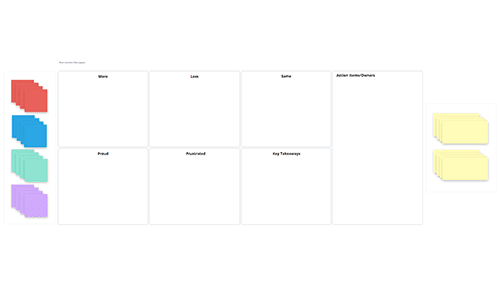
Post-mortem Retrospective
A post-mortem retrospective is where teams reflect on what went wrong, what went well, and what should be repeated on a project and identify changes to create a more streamlined process.
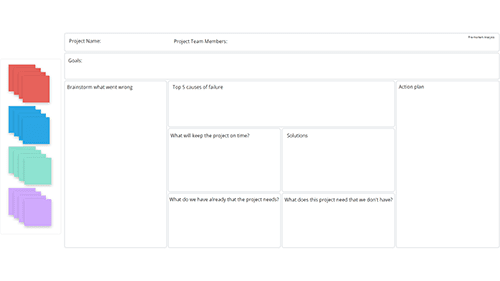
Pre-mortem Analysis
Pre-mortem Analysis is a project management planning tool that will help teams reflect on how past projects went and identify what can be changed moving forward to create a more streamlined process before a project starts.

Priority Kanban Board
Porter’s Five Forces is a framework for analyzing a company’s competitive environment, its competitive rivals, potential new market entrants, suppliers, customers, and substitute products that influence a company’s profitability.
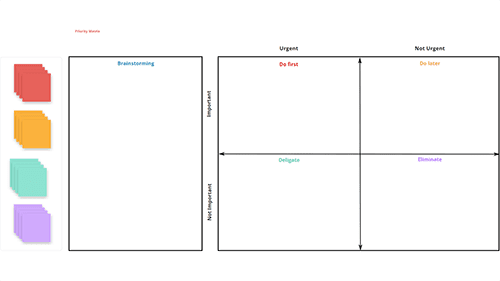
Priority Matrix
Priority Matrices are a useful technique for identifying problems most important to solve first. The matrix helps you rank problems or issues generated through brainstorming, using weighted criteria critical to your project.
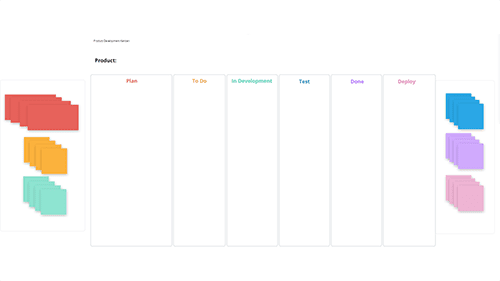
Product Development Kanban
Kanban boards are a visualization tool that enables you to enhance how a team works by using notes representing work items and columns representing each stage of the process.

Product Management Canvas
Product Management Canvas is a planning tool that aids in building products or features with a great user experience and outlining strategies to deliver.

Product-Market Fit Canvas
Product Market Fit Canvas canvas helps you understand what exactly your potential customers want and how you can fill their needs.
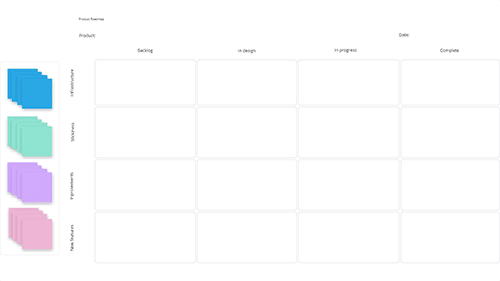
Product Roadmap
Product Roadmap is a great tool to forecast a product’s development, milestones, budget, timeline, align stakeholder expectations, and plan a successful product strategy.
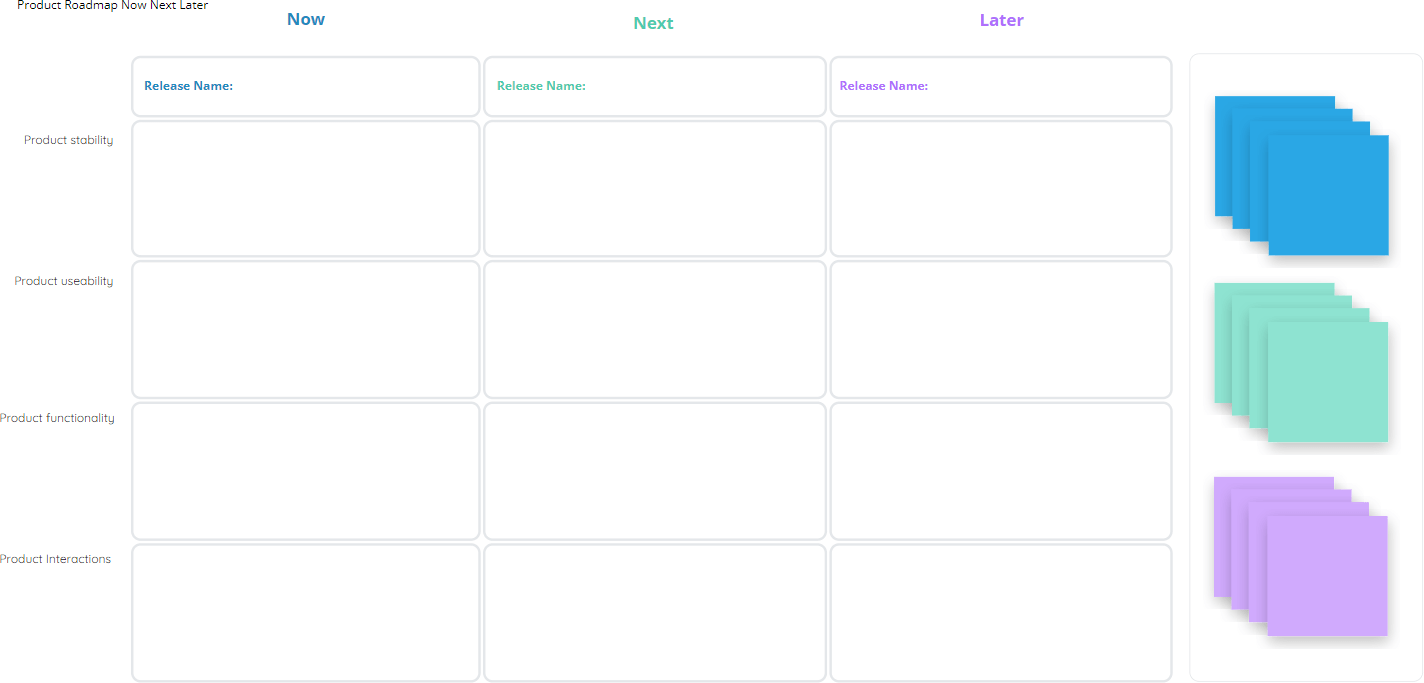
Product Roadmap Now Next Later
Product Roadmap Now, Next, Later, Never is a great tool to forecast a product’s development, to help plan a successful product strategy.

Product Vision Board
Product Vision Boards help your product development team describe and visualize your product, defining what you want your product to accomplish.
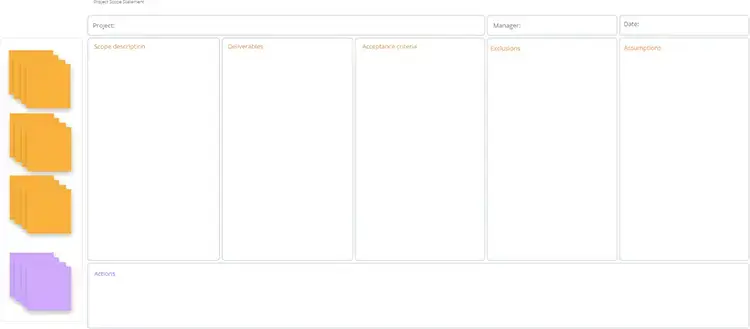
Project Scope Statement
Project Scope Statements help outline all aspects of a project, including all related activities, resources, timelines, deliverables, and the project’s limits.

Quick Retrospective Liked, Learned, Lacked & Longed For
Liked, lacked, learned, longed for is a popular four panel retrospective that asks teams to feedback on positives and negatives of a topic or project
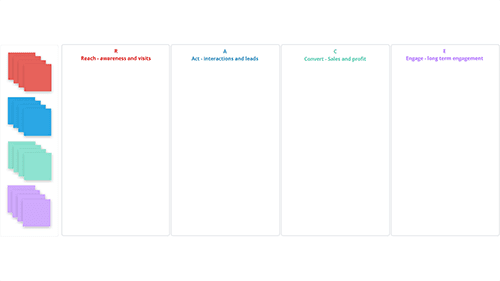
RACE Framework
RACE Framework helps marketers review their team’s digital marketing opportunities, develop strategies and develop action plans. Alternatively, the RACE template can be used as a practical planning framework to improve your team’s digital marketing.

RAID Log
| RAID log is a valuable planning tool that concentrates on four key areas: risks, assumptions, issues, and dependencies. It is often used at the beginning of a project to identify events, activities, and individuals that will impact the project’s successful completion. |

REAN Model
REAN is a tool for planning and analyzing marketing activities by considering four categories for developing a comprehensive strategy – Reach, Engage, Activate, and Nurture.
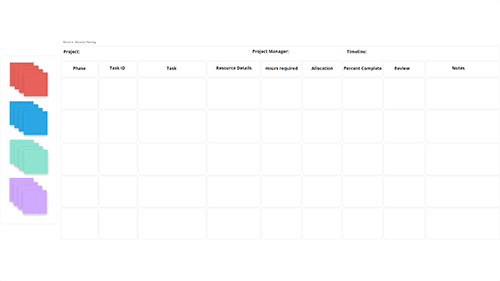
Resource Allocation Planning
The Resource Allocation Planning template is crucial for any organization to operate efficiently. To help negotiate multiple projects, teams, and tasks.

Reverse Brainstorming
Reverse Brainstorming identifies problems by brainstorming all the ways a plan or idea can fail, helping you avoid those issues and identify a better solution.
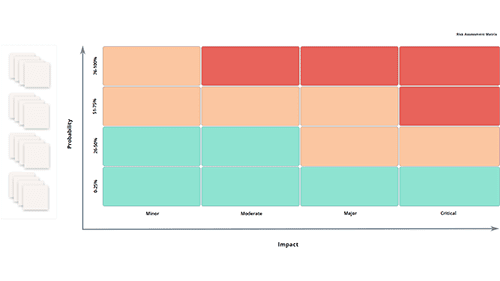
Risk Assessment Matrix
Risk Assessment Matrix is a simple tool to help identify and prioritize risks based on their likelihood and severity and ultimately lowers and minimizes the impact on your bottom line.

Rose Bud Thorn
Rose, Bud, Thorn helps participants analyze by visually categorizing the positive, potential, or negative aspects of the matter at hand.
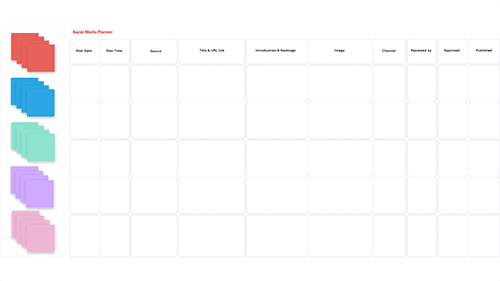
Social Media Planner
Social Media Planner will assist you in planning each day’s social media posts.
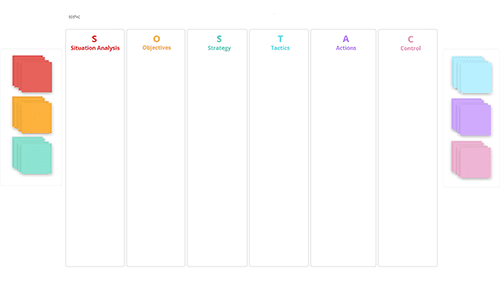
SOSTAC
SOSTAC is a popular tool used to model the creation of marketing or digital marketing strategies.
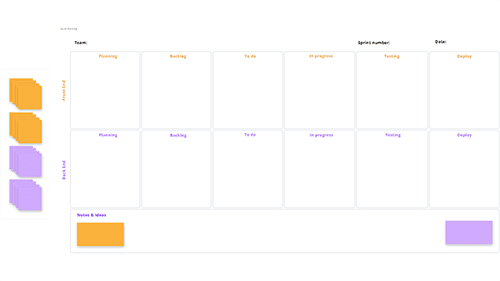
Sprint Planning
Sprint Planning is a collaborative effort that assigns tasks from the backlog to your team members to which they are responsible for their completion within the defined sprint period.
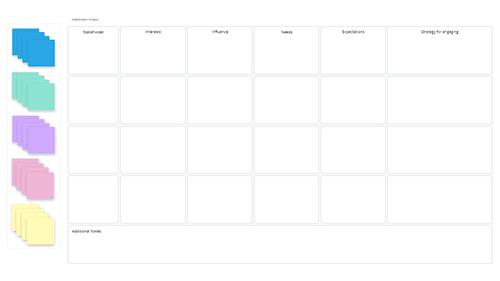
Stakeholders Analysis
A stakeholder analysis template is a project management tool used to analyze a project stakeholder to determine the necessary actions to align their goals with the project.
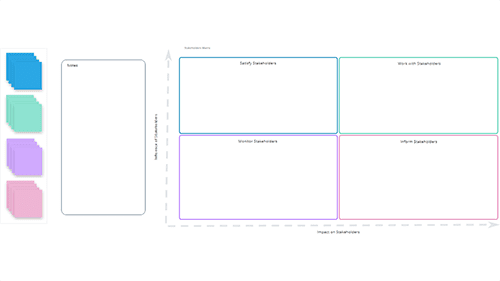
Stakeholders Matrix
The stakeholder matrix is an essential step in designing a new project to determine the necessary actions to align their goals. Stakeholders include individuals, community leaders, groups, and other organizations.

Team Canvas
Team Canvas is an excellent tool for teamwork. An effective technique for starting projects, aligning the team’s objectives, resolving conflicts, and setting team members their roles.

Team Charter
Team Charter structures your team’s purpose and objectives. Identifies resources needed and constraints, as well as the actions you need to take to reach your goals.
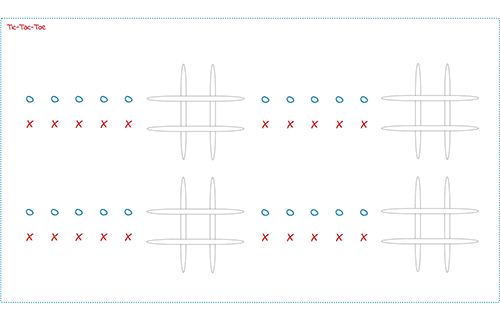
Tic-Tac-Toe
A tic-tac-toe template is a valuable tool for any team, particularly remote teams, as they help team members become comfortable and familiar with each other and have some fun.

User Story Map
User Story Map is a visual exercise that helps teams build a product or service based on how your users will interact and how it will create the most value.
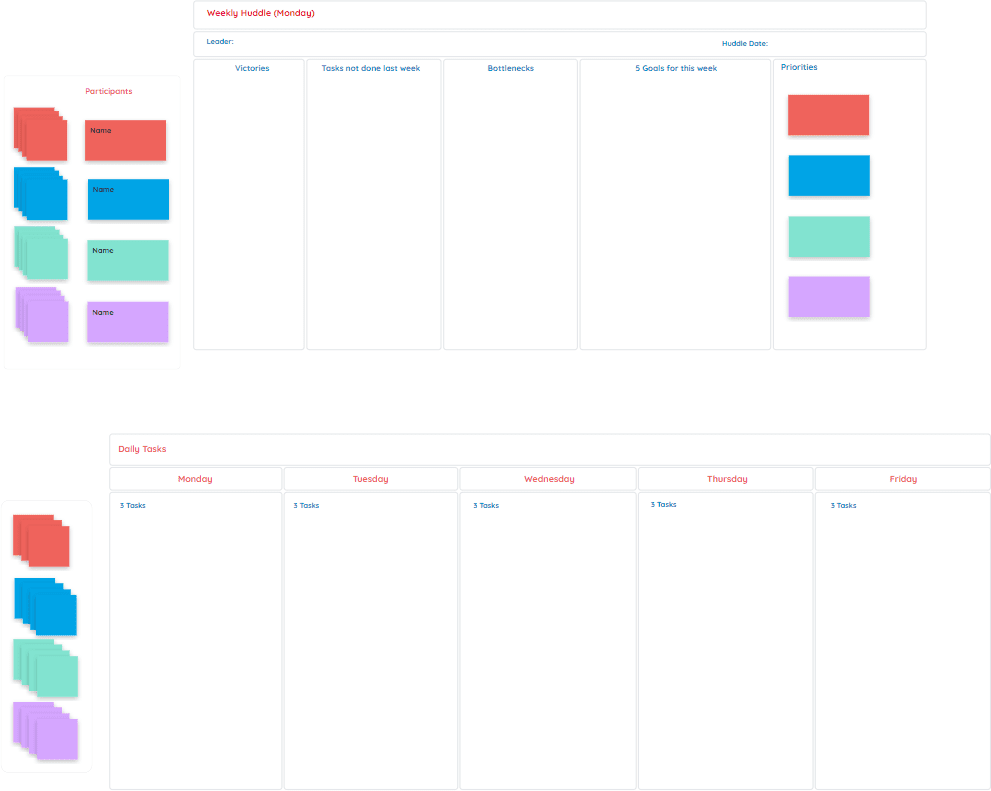
Weekly Huddle (Monday's)
Weekly Huddle keeps your team organized by creating weekly task schedules to help you stay on top.
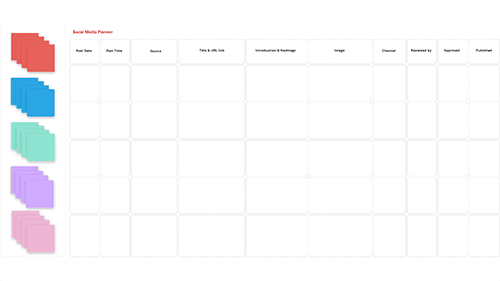
Weekly social media planner
Weekly Social Media Planner will assist you in planning each day’s social media posts for the week.

Weekly To Do List
Weekly To Do lists help you stay and your team organized by creating a weekly task schedule.

What do you SEE THINK WONDER?
See, Think, Wonder encourages students to make careful observations and interpretations, enabling the class to build on the group’s thinking and often results in richer discussions.

What Was Good? What Was Bad? Ideas & Actions
What was good? What was bad? Ideas and actions. An excellent retrospective to figure out what your team thinks is working and what is holding them back.
Applies To: Board Hosts, Board Facilitators, Board Editors
Plan Availability: Free*, Standard, Premium


